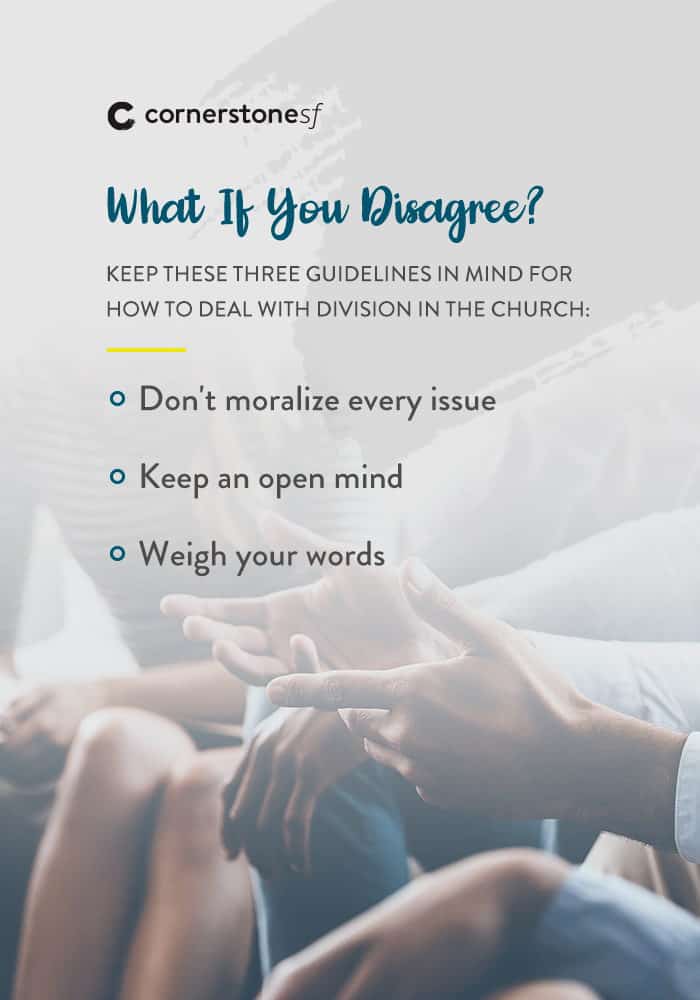
Unity. It's a word we often through around in church, but what exactly does it mean to be unified with the people in your church, and how can you foster this sense of unity? We're going to focus on the importance of unity in the church and talk about what you can do to create unity. Each of us has a role to play, and each of us has much to gain from being part of a unified Christian community.
How to Create Unity in the Church
What is unity? Does it mean you agree with everyone else in your church on everything? Does it mean that you all love pizza and hate pickles? All watch the same TV shows and listen to the same music? Of course not — we're all different, and that's great. So, what does it mean to be unified with people who are different from you?
Unity in the church is about coming together to form something bigger. It's recognizing that we're stronger together than we are individually. It's enjoying fellowship with each other. Unity in the church doesn't necessarily happen automatically. As with any relationship, we have to work continually at building and maintaining this unity. Ephesians 4:3 makes that clear when it commands us to "[m]ake every effort to keep the unity of the Spirit through the bond of peace."
How can we make every effort to maintain unity? Here are eight ways you can do your part to create unity in the church.
1. Remember Your Common Identity
First, it's important to keep your common identity at the forefront. Even though we may disagree on all sorts of things, the key to church unity is being on the same page when it comes to the main thing — which sports teams we root for. Just kidding. No matter how many differences you and another Christian have, you are united by something that goes far beyond a similar personality, interests or even sports franchise. You've both been changed by the truth of the Gospel and have been adopted into the same spiritual family.
The Bible backs this up repeatedly. For example, Galatians 3:28 tells us distinctions like gender or ethnicity are meaningless to Christians because we "are all one in Christ Jesus." In Philippians, Paul asks the church to complete his joy by "being like-minded, having the same love, being one in spirit and of one mind." That doesn't mean we all think exactly the same way. What it does mean is that we share a common identity in Jesus Christ.
2. Acknowledge Your Need for Community
The phrase "no man is an island" doesn't come from the Bible, but it certainly goes along with what the Word of God has to say about people and our need for community. You may be thinking, "but I'm an introvert" or "I'm an independent person." It's fine if you enjoy some alone time to catch up on your favorite show or read a book, but the fact is, none of us — not even the most introverted — would do well living in isolation. We need each other.
We need other Christians in our church to help us work through difficult times in our lives and even to rejoice with us when things are going great. We also need others to help us see areas where we need to grow and to pray for us. When we acknowledge our need for each other and do our best to live in community with other believers, it lays the foundation for unity.

3. Stay Humble
The command to "always stay humble and kind" doesn't just come from country music. It comes from the Bible. In discussing the importance of unity to the Ephesians, Paul says, "Be completely humble and gentle; be patient, bearing with one another in love." Philippians 2:3-4 says, rather than being conceited, we should "in humility value others above yourselves, not looking to your own interests but each of you to the interests of the others."
The Bible emphasizes humility repeatedly. Why is it so important to be humble? For one, when we're mindful of our own weaknesses, we're less likely to act self-righteous and judgmental and more likely to be gracious toward our brothers and sisters in Christ who have weaknesses of their own. Even Jesus rode in on a donkey — not a high horse. When each of us remains humble, we value each other more and truly feel our need for each other.
4. Embrace Your Differences
In 1 Corinthians, the Bible uses the human body as a metaphor for the church. Just as the body is comprised of different parts, all of which serve their own function, every member that makes up a church also serves their own function. To put it more simply, each of us has our own unique strengths and weaknesses. This passage makes it clear that unity doesn't mean we're all the same. We are each a unique piece that fits together to form a unified whole.
The person who sits in front of you in church may be a great teacher. The person behind you may be an amazing encourager. Or maybe they can make a batch of brownies that brings you and others a little piece of Heaven on Earth. No one person needs to be great at everything because we have each other. So embrace and celebrate those differences. If everyone in a church was exactly the same, it would be a pretty dull place.
5. Believe the Best in Others
When we're cynical and assume the worst about other people, we're bound to experience some disunity. For example, imagine a friend at church walks past you and doesn't say hi. You could assume they didn't see you or were in a hurry to get somewhere, or you could become offended and assume they must be giving you the silent treatment. Which of these responses is healthier and more conducive to maintaining unity?
Sure, there may be times when someone truly is brushing you off deliberately, but you can do a lot more harm by assuming the worst and being wrong than you can by assuming the best and being wrong. Wouldn't you want a friend to give you the benefit of the doubt? All of us have beautiful qualities and some not-so-beautiful qualities. Choose to focus on the good. As a writer for Christianity Today pointed out that, whether we look for the best in people or the worst, we'll find it.
6. Work Through Conflict
We all know that relationships with our family and partners can get messy at times. Maybe you've had a family dinner or a date that ended in a shouting match. Whenever you're close with someone, it's inevitable that your faults and differences will lead to some conflict. The question is how we respond. Do we pull away or lean in and work through the conflict? Relationships with our church family can also get messy at times, and our response is just as important here.
As Paul closes his second letter to the Corinthian church, he urges them to "strive for full restoration" in their relationships. This is a far cry from avoiding someone you've had a negative interaction or an argument with. Instead of letting the issue drive a wedge between you and your friend in the church, work through the conflict with them. Don't hesitate to ask for forgiveness when needed and be quick to forgive so you can enjoy full restoration in your relationships.

7. Check Your Motives
When conflicts arise or we're trying to respond, we should always check our motives. Our goal should always be to restore relationships and enjoy unified fellowship — not to get our point across, change someone's mind, make someone feel guilty or make them look bad. There are times when we're called to correct others, but we should only ever do it in love, for their own good.
Galatians 6:1 says that "if someone is caught in a sin, you who live by the Spirit should restore that person gently." This is a picture of kindness and humility, not a holier-than-thou mentality of condemnation. If you can't wait to go tell someone off, this is a good sign it's time to take a step back and prayerfully check your own heart. Leave your torches and pitchforks at home and approach the person in love, just as you would want them to do with you.
8. Don't Gossip
Our culture tends to love gossip. Maybe it's because calling attention to other people's dirty laundry makes us feel better about ourselves. Unfortunately, many people in the church love gossip too, though we tend to frame it a little differently. We may say things like, "Pray for so-and-so because I heard..." or throw in a "bless their heart" for good measure. No matter how we frame it, the Bible makes it clear that there is no place for gossip in the church.
Gossip is an excellent way to create disunity in the church. A writer for the Gospel Coalition recommends that when Christians hear someone gossiping, they should take a hard stance by lovingly calling the person out and redirecting the conversation. No matter how tempted you may be to talk about a fellow believer, you should commit yourself to building others up rather than talking badly about them behind their backs.

What If You Disagree?
You may be thinking, this is all well and good, but what do I do when I run into a disagreement with someone else in the church? We're not talking about a disagreement on whether drip or pour-over coffee is best or on whether cats or dogs make the best cuddle buddies. We're bound to disagree on lots of little things like this, and they likely won't get in the way of our friendships. However, more major disagreements can.
It could be a disagreement about doctrine, politics or another aspect of our belief system that seems important enough to either connect us or divide us. Politics, in particular, can be a major point of contention for some people in the church. No matter what the issue is, keep these three guidelines in mind for how to deal with division in the church:
- Don't moralize every issue: The Bible doesn't speak on every issue, and some topics are open to interpretation. Some issues are not so cut and dry, so each of us needs to rely on our own consciences and experience to discern the best way forward. It's okay if others come to different conclusions than you do.
- Keep an open mind: As with any disagreement, a little open-mindedness goes a long way. You may be sure you're right, but the other person likely is too. If you're in the midst of a disagreement with someone at your church, listen sincerely and consider the reality that you might be wrong or at least that you may not understand their perspective fully.
- Weigh your words: Ranting on social media and name-calling are not good strategies for maintaining unity. It's okay to share your opinions, but weigh your words carefully, always being respectful of the other person. And remember, in some cases, you're better off only listening and not saying much of anything.
The Importance of Unity in the Church
Why should we all be working to maintain a sense of unity in our churches? There are a few important reasons. Unity isn't just a nice bonus or a Christian buzzword. Unity is something to fight for. Why? Because there are some important benefits of unity in the church. To boil it down, unity:
- Enriches our lives: Each of us stands to benefit from being part of a unified church. We're weak on our own, but we're much stronger together. When we're unified with other believers, we can learn more, grow more and enjoy the type of community God designed us to be a part of.
- Glorifies God: Romans 15:5-7 asks God to grant his church harmony, or the same attitude of mind, so that we "[a]ccept one another, then, just as Christ accepted you, in order to bring praise to God." Note the ultimate goal here. When we're unified, we bring glory to our Father who desires to see His people living in close fellowship with each other.
- Helps our witness: When Christians are fighting with each other, it can hurt our witness with unbelievers. When we instead commit to church unity, we create a beautiful picture for the world of what it looks like to love others like Christ does. It also points to the perfect harmony God intends for the universe, a harmony that will be restored fully one day.
Be Part of the Community at Cornerstone
If you live in the San Francisco area and are looking for a church, come visit Cornerstone. We are a diverse community of believers who loves living and learning together. No Christian or church is perfect, including ours, but we strive toward becoming more mature in the faith and living in deeper unity together.





Leave a Reply
You must be logged in to post a comment.